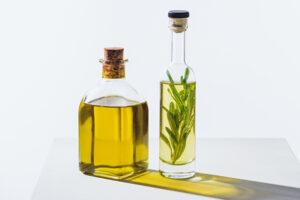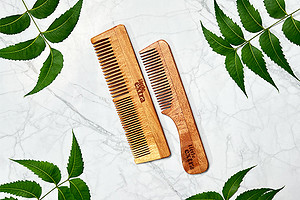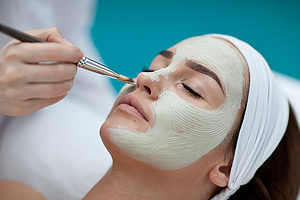Copper peptides play a significant role in new hair growth by aiding in the regeneration of hair follicles. They are the amino acid chains that provide protein to the hair structure. They help to make the hair look fuller by increasing the follicle size.

Copper peptides (1) transport nutrients to the hair shaft and send signals between the hair cells. The two peptides that increase hair sheen and give the hair a healthy look are collagen and elastin.
So, what are copper peptides, and how are they beneficial for your hair?
Article Contents
What Are Copper Peptides?
Copper peptides are small, natural protein fragments that attract copper ions, which are necessary for the body’s normal functioning.
A small study suggested that a copper-binding peptide (PC 1031) improves the growth of hair follicles and has a similar effect to minoxidil (a solution that helps treat pattern baldness) when tested on rats. (2)
Another research further revealed that a copper peptide (AHK-Cu) stimulates the elongation of hair follicles when experimented in the lab. (3)
A recent study conducted in 2021 found that copper peptide GHK-Cu (glycyl-L-histidyl-L-lysine) is a natural small copper-binding peptide present in human plasma. (4)
There are other copper peptides, but the most researched one is GHK-Cu, which improves hair growth. The copper tripeptide complex further boosts follicular enlargement and covers the follicle with downy hair. Topical GHK-Cu products increase collagen synthesis on the scalp, strengthen the hair, and improve hair growth. (4)(5)
GHK-Cu has various roles to play in the human body, such as promoting and activating the healing of wounds, improving immunity, and providing antioxidant and anti-inflammatory effects that stimulate collagen production and increase the growth of blood vessels. (6)
How Does Copper Peptides Improve Hair Growth?
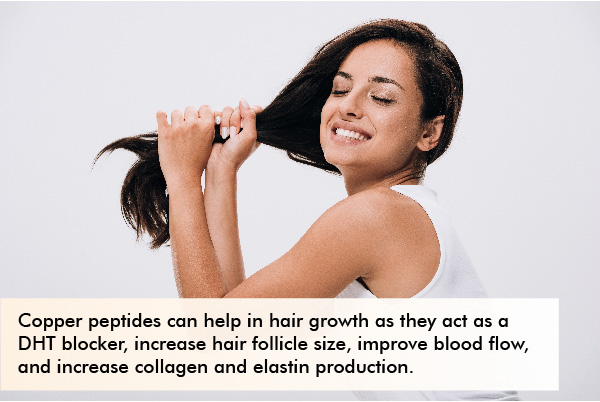
Here are some ways copper peptides can help in hair growth.
1. Acts as a DHT blocker
Dihydrotestosterone (DHT) is the most potent androgen that regulates hair cycling. (7) It is the most common cause of hair loss, and it is not uncommon to find raised DHT levels among people suffering from hair loss. (8)
When DHT binds to the androgen receptors in the hair follicles, the hair growth cycle is altered, leading to hair thinning. It is known that DHT binds to the follicle receptors five times more than testosterone.
Copper peptides reduce the damaging effects of DHT in the hair follicles where it is produced.
Copper ion deficiency is a significant cause of hair fall, leads to the formation of DHT (whose production increases during hair fall), and thus it restricts hair growth. When copper peptides are used then the copper ions present in it acts as facilitators to block DHT formation and thus help in facilitating hair growth. (9)
2. Increases hair follicle size
The tripeptide-copper complex has positive effects on hair growth through various mechanisms including dermal fibroblast stimulation and increased expression of vascular endothelial growth factor, both of which act as the main factor behind hair growth ( L-alanyl-L-histidyl-L-lysine-Cu2+ and glycyl-L-histidyl-L-lysine-Cu2+ are tripeptide-copper complexes that promote the growth of human hair follicles), as per a study conducted in 2016. (10)
Aging and poor hair health are factors that lead to hair loss. Weak follicles lead to brittle and damaged hair, which can start falling out.
GHK-Cu improves the growth of hair follicles. Copper peptides play a vital role in hair growth and add volume to hair by improving hair follicle size. If you have sufficient copper peptides, your hair starts appearing thicker and fuller.
3. Improves blood flow
Copper peptides increase blood flow to all the parts of the scalp and rejuvenate the hair roots. It delays the process of aging and supplies oxygen and nutrients to different parts of the scalp, nourishing and strengthening the hair.
As you age, blood in the scalp diminishes, leading to hair loss. Copper peptides help to resume hair growth by stimulating the hair capillaries and bringing lost blood circulation to the scalp. (11)
GHK-Cu helps increase the blood flow to the damaged part of the hair scalp with a combination of three actions: angiogenesis (new blood vessel formation), anticoagulation, and vasodilation.
GHK-Cu increases the production of vascular endothelial growth factors which is a major mediator of hair follicle growth. Additionally, GHK-Cu’s ability to promote collagen and elastin synthesis restores blood vessel walls. (11)
4. Increases collagen and elastin production
The copper tripeptide GHK-Cu complex heals wounds and increases the release of collagen. (12) GHK-Cu is available in human serum and cerebrospinal fluid; it combines with copper to facilitate the synthesis of collagen (13) and elastin. (14)
Copper peptides increase collagen and elastin levels (6) and increase the fat cells on the scalp, leading to an increase in hair growth and strengthening of the hair follicles.
How to Use Copper Peptides on Hair?
Topical preparations of copper peptides are available for stimulating hair growth. Serums containing high concentrations of GHK-Cu within the safe limit are also available for boosting hair growth.
You can apply this type of serum to your scalp once or twice a week to promote hair growth. Massage the serum gently, leave it on your hair, and then wash it off.
How to Consume Copper Peptides Orally and in What Dosage?
Copper peptides play a considerable role in the synthesis and stabilization of hair proteins. It also possesses powerful biocidal properties that contribute to the healing of wounds. (14)
If taken through injection (subcutaneously), 1 mg for 30 days is sufficient. It can also be taken as a tablet of 10 mg daily.
What Is the Best Way to Consume Copper Peptides?
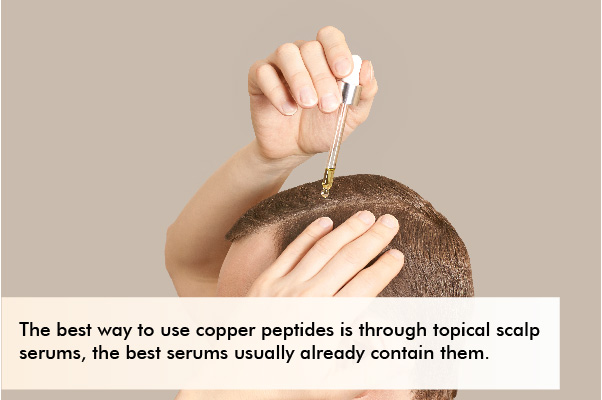
The best way to use copper peptides is through topical scalp serums. The best serums usually already contain them. Moreover, medicated or plant-based actives are synergistic with these peptides and enhance their effects.
Examples of these ingredients are palmetto berry extract and rosemary leaf oil extract, which help support hair growth. (8)
General Queries Related to Copper Peptides for Hair
Are copper peptides safe for the skin and scalp?
GHK-Cu is safe and inexpensive, and it comes with a wealth of benefits. The key is to use it in the right way, especially the injectables. Researchers have shown that a 100–200 mg dose can produce a therapeutic effect on the hair.
Skin care and hair care products usually contain safe levels of GHK-Cu.
Do copper peptides provide a positive effect?
Yes, they provide positive effects. However, it is unsure if topical noninvasive applications would have an impact similar to that of injection and microneedling as the former has high hydrophilicity and poor transdermal penetration. (15)
What should I not use with copper peptides?
Can copper peptides penetrate the skin?
Yes, they can reach deeper skin levels on the face and scalp.
Can I use copper peptides on the hair and scalp?
You can use it on your hair in the form of serums and on the scalp in the form of creams or ointments.
Are there any side effects of using copper peptides?
There are a few side effects of using it. Copper can harm the body if present in high quantities. Thus, it is advised to consult a doctor before using them.
Are copper peptides compatible with biotin?
Yes, Biotin improves hair density and is also compatible with copper peptides.
Final Word
Besides using hair treatments, consuming a nutritious diet strengthens and nourishes your hair. One thing to remember is to keep your scalp moisturized and free from inflammation.
New-age hair loss remedies such as copper peptides help stimulate the hair follicles and nourish the scalp to generate healthy hair.
References
- Ramam M, Rao PN, Taneja A, et al. 2017-83-1. Indian Journal of Dermatology, Venereology and Leprology. https://ijdvl.com/issue/2017-83-1/.
- S; UHK. Chemical agents and peptides affect hair growth. The Journal of investigative dermatology. https://pubmed.ncbi.nlm.nih.gov/8326148/.
- Pyo HK; Yoo HG; Won CH; Lee SH; Kang YJ; Eun HC; Cho KH; Kim KH; The effect of tripeptide-copper complex on human hair growth in vitro. Archives of pharmacal research. https://pubmed.ncbi.nlm.nih.gov/17703734/.
- Pickart L, Margolina A. Skin regenerative and anti-cancer actions of copper peptides. MDPI. https://www.mdpi.com/2079-9284/5/2/29. Published April 21, 2018.
- Topical peptide treatments with effective anti-aging results – researchgate. https://www.researchgate.net/publication/317120448/.
- Pickart L, Margolina A. Regenerative and protective actions of the GHK-cu peptide in the light of the new Gene Data. International journal of molecular sciences. https://www.ncbi.nlm.nih.gov/pmc/articles/PMC6073405/. Published July 7, 2018.
- Chen X, Liu B, Li Y, et al. Dihydrotestosterone regulates hair growth through the Wnt/β-catenin pathway in C57BL/6 mice and in vitro organ culture. Frontiers in pharmacology. https://www.ncbi.nlm.nih.gov/pmc/articles/PMC6989660/. Published January 23, 2020.
- Rajput RJ. Controlled clinical trial for evaluation of hair growth with low dose cyclical nutrition therapy in men and women without the use of Finasteride. Plastic and Aesthetic Research. https://parjournal.net/article/view/2220. Published September 30, 2017.
- (PDF) serum zinc and copper levels in alopecia – researchgate. https://www.researchgate.net/publication/334283902/.
- Lee WJ, Sim HB, Jang YH, Lee S-J, Kim DW, Yim S-H. Efficacy of a complex of 5-aminolevulinic acid and glycyl-histidyl-lysine peptide on hair growth. Annals of dermatology. https://www.ncbi.nlm.nih.gov/pmc/articles/PMC4969472/. Published August 2016.
- Pickart L, Vasquez-Soltero JM, Margolina A. The human tripeptide GHK-cu in prevention of oxidative stress and degenerative conditions of aging: Implications for Cognitive Health. Oxidative medicine and cellular longevity. https://www.ncbi.nlm.nih.gov/pmc/articles/PMC3359723/. Published 2012.
- Sharma S, Anwar MF, Dinda A, Singhal M, Malik A. In vitro and in vivo studies of ph-sensitive GHK-cu-incorporated Polyaspartic and polyacrylic acid superabsorbent polymer. ACS omega. https://pubs.acs.org/doi/10.1021/acsomega.9b00655. Published November 19, 2019.
- Biochemistry, collagen synthesis – statpearls – NCBI bookshelf. https://www.ncbi.nlm.nih.gov/books/NBK507709/.
- Borkow G. Using copper to improve the well-being of the skin. Current chemical biology. https://www.ncbi.nlm.nih.gov/pmc/articles/PMC4556990/. Published August 2014.
- Topical and nutricosmetic products for healthy … – Wiley Online Library. https://faseb.onlinelibrary.wiley.com/doi/10.1096/fba.2021-00022.
- Center for Food Safety and Applied Nutrition. Cosmetics alpha hydroxy acids. U.S. Food and Drug Administration. https://www.fda.gov/cosmetics/cosmetic-ingredients/alpha-hydroxy-acids.
- Cosmeceuticals for the skin: An overview – innovare academic S. https://innovareacademics.in/journal/ajpcr/Vol4Issue2/260.pdf.



